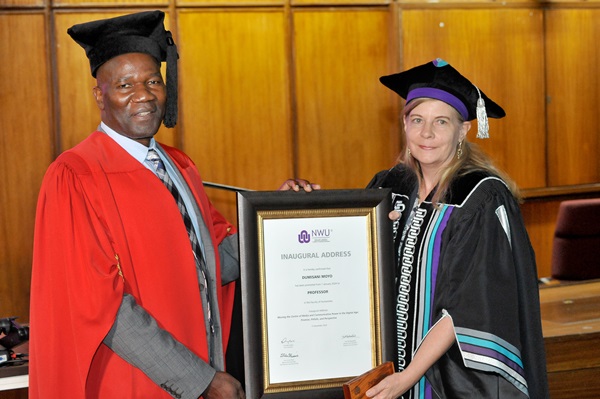Prof Dumisani Moyo, executive dean of the Faculty of Humanities at the North-West University (NWU), delivered his inaugural address on Wednesday, 13 November 2024. The title of his presentation was “Moving the Centre of Media and Communicative Power in the Digital Age: Promise, Pitfalls, and Perspectives”.
Prof Moyo is the former vice-dean of the School of Communications at the University of Johannesburg. He served as the Africa regional manager for the World Association of Newspapers programme and is currently a member of the executive committee of the South African Humanities Deans Association.
Prof Mirna Nel, deputy dean for Research and Innovation at the NWU’s Faculty of Humanities, welcomed the esteemed guests and had the honour of reading Prof Moyo’s biography. She emphasised Prof Moyo’s leadership and integrity.
“I am most grateful for this once-in-a-lifetime opportunity to critically reflect on my academic journey and contribution to my field. I have taken it as an opportunity to dust off the bookshelves and retrace my career path, and to share some of my accomplishments with you through this lecture,” said Prof Moyo as he prepared to deliver his address.
Prof Moyo’s research outlines two distant but connected phases:
· Traditional media and their role in the democratisation processes, especially in emerging democracies in Africa, looking at issues of broadcasting policy and regulation, with a special interest in radio.
· The shift to digital media and its implications for democracy, traditional media, society and for the future.
In this lecture, Prof Moyo offered insight into the radio listenership of 39 African countries. This demonstrated that radio remains the most influential legacy medium, as it reaches the deep pockets of populations no other mediums can reach, and it cuts through barriers of literacy, language, electricity distribution and geography.
According to Prof Moyo, the nature of talk radio, particularly live phone-in programmes, greatly weakens the hosts’ gate-keeping powers, allowing hate speech and offensive remarks to spread before they can be filtered out. He further underlined that radio can be a dangerous tool when poorly managed.
He stressed the importance of policies and regulations that integrate new media while maintaining the positive aspects of traditional media.
Prof Dumisani urged scholars in the faculty to start rethinking their approaches and connect with communities to challenge all forms of oppression and to have the courage to drive social change. He argued that this adaptation is essential to ensure research and analysis remain relevant and reflective of the current media landscape.
Prof Moyo stated that, in contrast to traditional media ownership, internet-based social media platforms have tremendous capacity to impact discourse on an incredibly rapid global scale.
“Traditional media face an existential crisis of huge proportions as their business models have been turned upside down by digital disruption. Advertising, which underpinned most traditional media institutions, has migrated to the online sphere, forcing media institutions out of business,” he said.
Following his address, Prof Hopeton Dunn from the University of Botswana served as a respondent. He highlighted that Prof Moyo had delivered an excellent inaugural lecture.
The vice-principal and acting deputy vice-chancellor for Teaching and Learning, Prof Linda du Plessis, presented Prof Moyo with the certificate and offered a word of congratulation.
“Congratulations on receiving your full professorship. In your role as the dean of the Faculty of Humanities, you demonstrate that leadership is not just about holding a title but about leading by example. It is an honour to collaborate with you and also to witness your journey.”
Prof Moyo concluded that the fast advances in technology over the past two decades will inevitably lead to a shift in the dominance of media and communication.
Prof Dumisani Moyo and Prof Linda du Plessis

